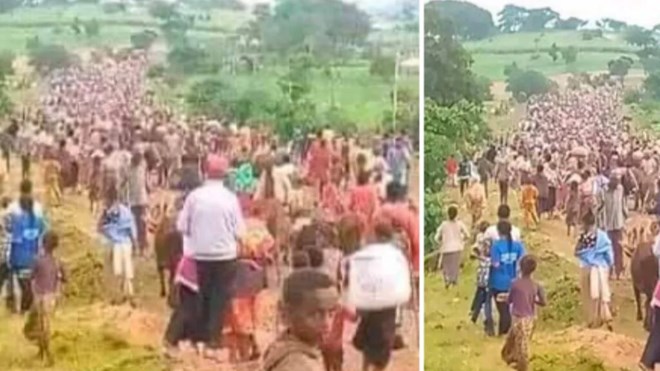A photo that went viral on social media last week depicts the mass evacuation of civilians following the attack. ADDIS NORMS
KIRIBO — The country’s human rights commission reported on Tuesday that during three days of racially motivated violence in late August in Ethiopia’s most populous region, Oromiya, gunmen killed over 60 people and displaced 20,000
In the past two years, violence in Oromiya, which is home to the Oromos, Ethiopia’s largest ethnic group, as well as other communities like the Amharas, the country’s second-largest, has increased due to a confluence of ethnic grievances and political tensions.
According to the state-appointed Ethiopian Human Rights Commission (EHRC), the most recent bloodshed began on August 29 when OLA fighters attempted to take over the town of Obora.
According to the EHRC, Amharas from nearby districts, including those who crossed the border into the neighbouring Amhara region, carried out retaliatory killings against Oromos over the course of the next two days.
“More than 60 people died and more than 70 were injured over the course of the two-day attack. Property and livestock were also stolen “the EHRC stated, citing residents and government representatives.
“More than 20,000 people were displaced as a result of the attack and are now in Obora town,” it stated.
The conflict in northern Tigray, which pits Ethiopia’s federal army against supporters of the region’s ruling Tigray People’s Liberation Front (TPLF), is distinct from the violence in Oromiya.
However, despite recent political developments, both crises have their roots in long-standing conflicts and rivalries that have existed throughout Ethiopia’s turbulent history.
After last year’s alliance between the TPLF and the OLA alarmed the government, it stepped up its campaign against armed Oromiya groups.
After assisting Prime Minister Abiy Ahmed, who is of mixed Oromo-Amhara ancestry, win the 2018 election, Oromos had hoped that their situation would improve. Oromos have long complained of marginalisation and neglect by Ethiopia’s central government.
Many people, however, have lost faith in the prime minister, and political analysts claim that some of his reforms appear to have given regional power brokers the confidence to pursue building ethnic support bases, occasionally using violent means.
Requests for comments on the EHRC statement were not immediately answered by the regional Oromo, Amhara, and OLA administrations’ spokespeople.

